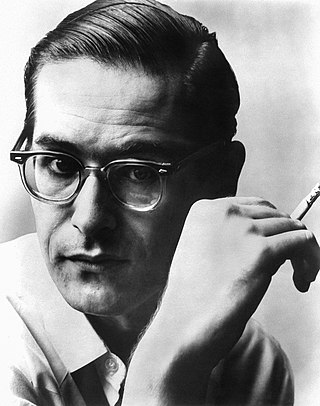
William John Evans was an American jazz pianist and composer who worked primarily as the leader of his trio. His use of impressionist harmony, block chords, innovative chord voicings, and trademark rhythmically independent, "singing" melodic lines continue to influence jazz pianists today.

Portrait in Jazz is the fifth studio album by American jazz pianist Bill Evans as a leader, released in 1960. It is the first of only two studio albums to be recorded with his famous trio featuring bassist Scott LaFaro and drummer Paul Motian.
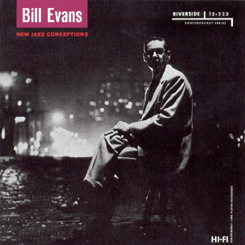
New Jazz Conceptions is the debut album by jazz pianist Bill Evans, recorded in two sessions during September 1956 for Riverside Records.

The Tony Bennett Bill Evans Album is a 1975 studio album by singer Tony Bennett and pianist Bill Evans.
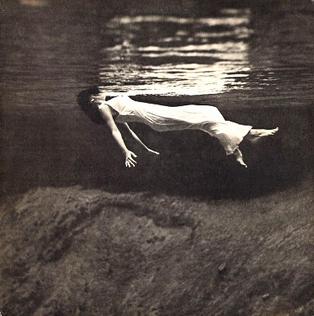
Undercurrent is a 1962 jazz album by pianist Bill Evans and guitarist Jim Hall. The two artists collaborated again in 1966 on the album Intermodulation.
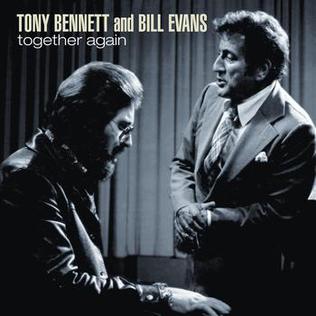
Together Again is a 1977 studio album by singer Tony Bennett and jazz pianist Bill Evans. It was originally issued on Bennett's own Improv Records label, which went out of business later that year, but was subsequently reissued on Concord.

You Must Believe in Spring is an album by American jazz pianist Bill Evans, recorded by him with bassist Eddie Gómez and drummer Eliot Zigmund in August 1977 and released in February 1981, shortly after Evans's death in September 1980.
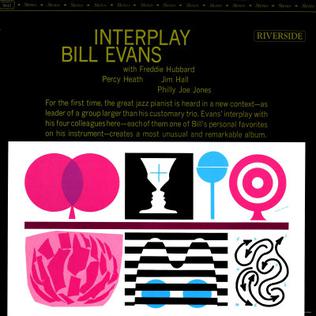
Interplay is a 1963 album by jazz musician Bill Evans. It was recorded in July 1962 in New York City for Riverside Records. The Interplay Sessions is a 1982 Milestone album that includes the entirety of this album, and tracks recorded for Riverside on August 21 and 22 of the same year with a different lineup . The Interplay Sessions peaked at number 26 on the Billboard Jazz Albums charts in 1983. The CD reissue Interplay adds another take of "I'll Never Smile Again" as a bonus track. At the Grammy Awards of 1984, Orrin Keepnews won the Grammy Award for Best Album Notes for the reissue.

Further Conversations with Myself is a 1967 album by jazz pianist Bill Evans. All the pieces are solo with piano overdubs, a method Evans used on his earlier release Conversations with Myself. This time, however, he employed only two piano tracks instead of three. The album was nominated for a Grammy. It was reissued on CD by Verve in 1999.

Alone is a solo piano album by jazz musician Bill Evans, recorded in the fall of 1968 for Verve Records, featuring a particularly notable 14+-minute performance of the jazz standard "Never Let Me Go". Evans contributed notes to the album, including the following statement:
Perhaps the hours of greatest pleasure in my life have come about as a result of the capacity of the piano to be in itself a complete expressive musical medium. In retrospect, I think that these countless hours of aloneness with music unified the directive energy of my life. At those times when I have achieved this sense of oneness while playing alone, the many technical or analytic aspects of the music happened of themselves with positive rightness which always served to remind me that to understand music most profoundly one only has to be listening well. Perhaps it is a peculiarity of mine that despite the fact that I am a professional performer, it is true that I have always preferred playing without an audience. This has nothing to do with my desire to communicate or not, but rather I think just a problem of personal self-consciousness which had to be conquered through discipline and concentration. Yet, to know one is truly alone with one’s instrument and music has always been an attractive and conducive situation for me to find my best playing level. Therefore, what I desired to present in a solo piano recording was especially this unique feeling.

I Will Say Goodbye is an album by American jazz pianist Bill Evans, recorded in 1977 but not released until January 1980. It was his final album for Fantasy Records, making the title quite appropriate.
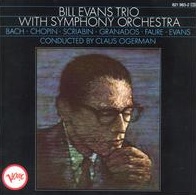
Bill Evans Trio with Symphony Orchestra is an album by American jazz pianist Bill Evans and his trio, released in 1966, featuring jazz arrangements of works by classical composers Granados, J.S. Bach, Scriabin, Fauré, and Chopin. The trio is accompanied by an orchestra consisting of strings and woodwinds arranged and conducted by Claus Ogerman. Originals by both Evans and Ogerman are also included.
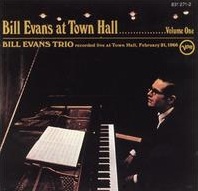
Bill Evans at Town Hall is a live album from 1966 by American jazz pianist Bill Evans and his trio. It is his only commercial trio recording featuring drummer Arnold Wise, and it was the last recorded appearance of bassist Chuck Israels as a regular member of the trio.
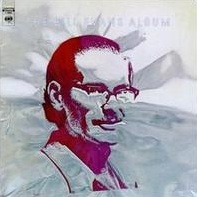
The Bill Evans Album is a recording by the jazz pianist Bill Evans, released in 1971 on the Columbia label. It was his first album to feature all compositions written, arranged, and performed by him. On the record, Evans plays both an acoustic and a Fender Rhodes electric piano.

Quintessence is an album by American jazz pianist Bill Evans. It was recorded in 1976 for Fantasy Records and released the following year. At this time usually playing solo or with his trio, for these sessions Evans was the leader of an all-star quintet featuring Harold Land on tenor saxophone, guitarist Kenny Burrell, Ray Brown on bass, and Philly Joe Jones on drums.

Intuition is a jazz album by pianist Bill Evans and bassist Eddie Gómez released by Fantasy Records in 1975.
"Waltz for Debby" is a jazz standard composed by pianist Bill Evans, which became "his most famous tune." He first recorded it as a brief solo piano piece on his debut album, New Jazz Conceptions (1956). Lyrics were added about six years later by Evans's friend Gene Lees. "Debby" in the composition's title refers to Evans's then 3-year-old niece, Debby Evans, whom he often took to the beach.

Since We Met is a live album by jazz pianist Bill Evans with Eddie Gómez and Marty Morell, recorded at the Village Vanguard in New York City in 1974 and released on the Fantasy label in 1976. Additional recordings from Evans's 1974 Village Vanguard performances were also issued on the album Re: Person I Knew, released posthumously in 1981. Since We Met was digitally remastered and reissued as a CD in 1991 on Original Jazz Classics.

The Tokyo Concert is a live album by jazz pianist Bill Evans with bassist Eddie Gómez and drummer Marty Morell recorded at the Yūbin Chokin Hall in Tokyo, Japan, in 1973 and released on the Fantasy label.

Time Remembered is a live album by jazz pianist Bill Evans with Chuck Israels and Larry Bunker partially recorded at the Shelly Manne's club in Hollywood, California in May 1963, but not released until 1983 on the Milestone label as a 16-track double LP. It would be later reissued on CD in 1999, with only 13 tracks. The trio performances were recorded at the same sessions that produced At Shelly's Manne-Hole (1963) and were first released on Bill Evans: The Complete Riverside Recordings (1984). The four solo performances were recorded in a separate session in April 1962 in New York City. "Some Other Time" was recorded in December 1958, in New York City.



















